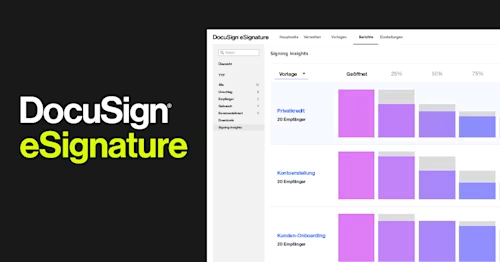
Neu: Signing Insights für eSignature
Signing Insights ist ein neues Visualisierungstool für Daten, mit dem Administratoren das Verhalten von Unterzeichnern besser verstehen können.

Täglich werden in Organisationen Daten zu geschäftlichen Vereinbarungen erfasst - seien es Verkaufsverträge oder Dokumente zur Kreditvergabe - Oftmals reichen viele dieser Daten nicht aus, um effektive Geschäftsentscheidungen zu treffen. Laut Forrester bleiben im Durchschnitt 60 % bis 73 % aller Daten in einem Unternehmen für Analysen ungenutzt. Dabei bietet die Möglichkeit, auf verwertbare Daten zuzugreifen und diese zu nutzen, deutlich organisatorische Vorteile wie verbesserte Effizienz, effektivere Entscheidungsfindung und eine bessere finanzielle Leistung.
Unsere Mission bei Docusign lautet, Kunden dabei zu helfen, Ihr Geschäft voranzubringen. Da ein großer Teil im Geschäft darin besteht, wertvolle und nachvollziehbare Daten zur Hand zu haben, freuen wir uns, Signing Insights für eSignature anzukündigen. Signing Insights ist ein neues Tool zur Datenvisualisierung, das Administratoren hilft, das Verhalten von Unterzeichnern besser zu verstehen.
Unterschiedlichste Organisationen haben nun Zugriff auf neue Datenpunkte, wie z. B. die Möglichkeit, Einblicke in die Reise der Unterzeichner zu erhalten, gefiltert nach Vorlagen, Powerforms, Endgeräten, verwendeten Browsern und vieles mehr. Diese neu aufgedeckten Datenpunkte helfen dabei, zu erkennen, wo im Signier-Prozess womöglich Schwierigkeiten auftreten und Unterzeichner abspringen. Diese Erkenntnisse können dann genutzt werden, um diesen Prozess zu optimieren und folglich die Vertragsabschlussraten zu erhöhen. Zum Beispiel kann ein Administrator sehen, dass die Unterzeichner einer bestimmten Vorlage eine ungewöhnlich hohe Abbruchrate zu Beginn der Unterschriftensitzung haben. Der Administrator kann sich dann darauf konzentrieren, die Benutzerfreundlichkeit der Vorlage zu verbessern, um die Abschlussraten zu maximieren.
Einfaches Nachvollziehen der Verhaltensmustern von Unterzeichnern mit leistungsstarken Datenvisualisierungen
Aufzeigen wertvoller Daten-Erkenntnisse durch fortgeschrittene Datenfilter
Self-Service Analysen anhand einfach zu bedienender Dashboards
Entdecken Sie tiefe Einblicke, die zu besseren Ergebnissen führen. Signing Insights bietet Ihnen ein umfassendes Verständnis Ihrer Unterzeichner, sodass Sie ein besseres Erlebnis im Prozess der Unterzeichnung bieten können. Nutzen Sie leistungsstarke Datenvisualisierungen, die jeder verwenden kann, erkennen Sie schnell Muster und gewinnen Sie mit einem robusten Satz von Filtern mehr Erkenntnisse. Wandeln Sie Daten in Aktionen um.
Erfahren Sie mehr über Signing Insights in unserem User Guide.

Ähnliche Beiträge
Docusign IAM ist die Vertragsplattform, die Ihr Unternehmen braucht



